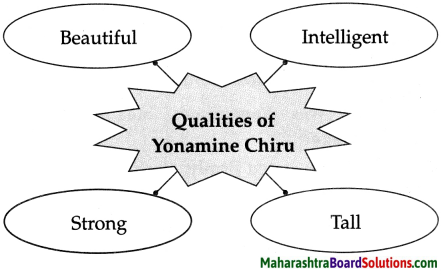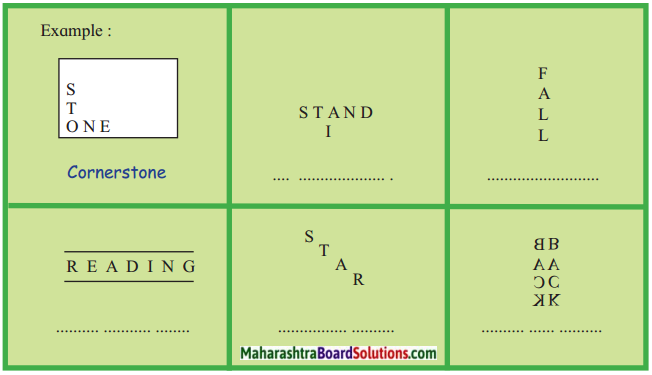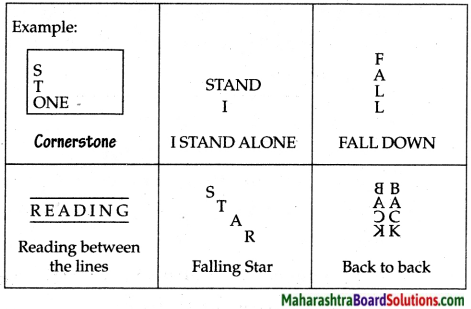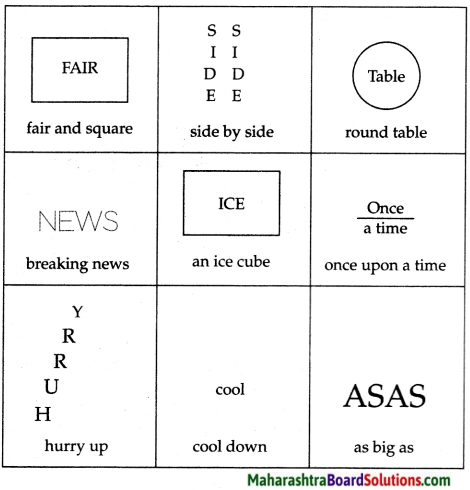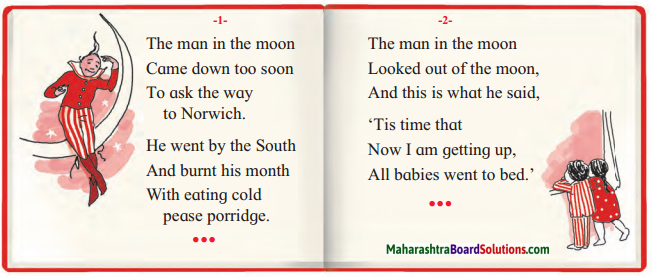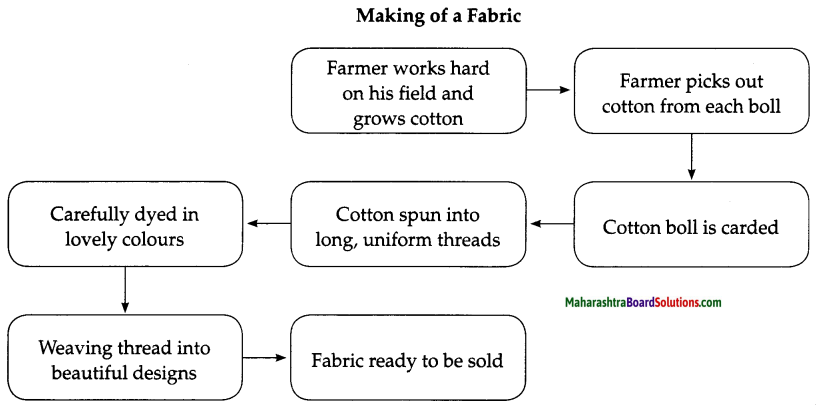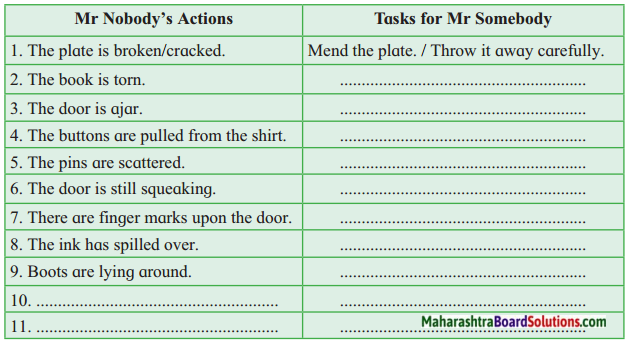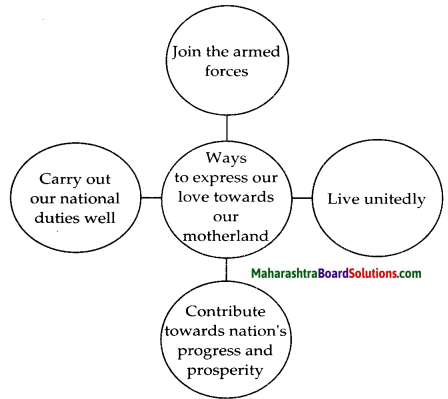Balbharti Maharashtra State Board Class 6 English Solutions Chapter 4.7 The Sword in the Stone Notes, Textbook Exercise Important Questions and Answers.
Maharashtra State Board Class 6 English Solutions Chapter 4.7 The Sword in the Stone
Class 6 English Chapter 4.7 The Sword in the Stone Textbook Questions and Answers
1. Read the passage. Underline the new words. Guess their meaning from the context. Verify it from a good dictionary.
Question 1.
Read the passage. Underline the new words. Guess their meaning from the context. Verify it from a good dictionary.
2. Put the following events in chronological order.
Question a.
The sword in the stone appeared in the churchyard.
Answer:
Ancient Britain was invaded by wild Barbarians.
![]()
Question b.
Lord Uther died.
Answer:
Lord Uther drove the Barbarians away.
Question c.
Lord Uther drove the barbarians away.
Answer:
Lord Uther drove the Barbarians away.
Question d.
The Lords and Knights began to fight for the kingdom.
Answer:
Merlin entrusted a baby to Sir Ector.
Question e.
Sir Kay left his sword behind at home.
Answer:
Lord Arthur grew up in Sir Ector’s house.
Question f.
Merlin announced that Arthur was the son of Lord Uther.
Answer:
Lord Uther died.
![]()
Question g.
Arthur brought the sword from the churchyard.
Answer:
The Lords and Knights began to fight for the kingdom.
Question h.
Ancient Britain was invaded by wild Barbarians.
Answer:
The sword in the stone appeared in the churchyard.
Question i.
Many knights tried to pull the sword out of the stone.
Answer:
Many knights tried to pull the sword out of the stone.
Question j.
Arthur grew up in Sir Ector’s house.
Answer:
Sir Kay left his sword behind at home.Arthur brought the sword from the churchyard.
![]()
Question k.
Merlin entrusted a baby to Sir Ector.
Answer:
Merlin announced that Arthur was the son of Lord Uther.
3. What do the following events/actions tell us about the characters? Discuss.
Question a.
The Archbishop announced that everyone was free to try his hand at the sword and called all the Lords to the Great Tournament.
Answer:
The Archbishop is a bishop or priest of the highest rank. By giving a chance to all the lords to try their hand at the sword, he showed that he was fair and impartial. Through this act, he proved that he believed in giving everyone an equal chance. He acted responsibly in finding the rightful King of Britain.
Question b.
Arthur agreed to bring Sir Kay a sword at once.
Answer:
Arthur wanted his brother to win the tournament. He was dutiful and wanted to do all he could to help him achieve success at the tournament. He was excited about the prospects of this brother’s victory.
![]()
Question c.
Sir Ector asked Sir Kay to show him whether he could draw the swords out the stone.
Answer:
Sir Ector was a man of integrity and honesty. He believed in always being truthful. These were the very lessons he had taught his sons too. Sir Ector insisted that Sir Kay show him whether he could draw the sword of the stone to ascertain whether his son’s claim was true.
Question d.
Sir Ector kneeled before Arthur.
Answer:
Sir Ector did a splendid job of bringing up Arthur. But on realizing that he was the son of the good Lord Uther Pendragon he bowed down to authority with the devotion as Arthur was the King of Britain. This shows that he respected the king of the land though he had brought him up as his own son.
4. Find five words each.
Question a.
with the suffix:
-less,
-ly,
-ness
Answer:
| -less | -lv | -ness |
| speechless | angrily | lawlessness |
| thankless | neatly | anxiousness |
| helpless | urgently | brightness |
| aimless | gently | carelessness |
| careless | silently | farsightedness |
![]()
Question b.
with the prefix:
un- in-
Answer:
| un…………… | in…………… |
| 1. Unsafe 2. uncomfortable 3. unaware 4. unknown 5. uncommon | 1. Insecure 2. insignificant 3. infamous 4. incomplete 5. inactive. |
5. Visit a library: Read the stories of King Arthur and his Knights of the Round Table.
Question 1.
Visit a library: Read the stories of King Arthur and his Knights of the Round Table.
Class 6 English Chapter 4.7 The Sword in the Stone Additional Important Questions and Answers
Answer in one or two sentences.
Question 1.
Why did people make Lord Uther the King of Britain and give him the title Pendragon?
Answer:
In ancient Britain, at a time when the land was invaded by wild Barbarians, the good and noble Lord Uther fought them bravely and drove them away from his land. The people made him King of Britain and gave him the title, Pendragon, meaning ‘dragon’s head’.
![]()
Question 2.
Write one instance to prove that lawlessness prevailed in Britain after the King died.
Answer:
Armed robbers roamed the countryside, pillaging farms and fields, and people felt unsafe and insecure in their own homes.
Question 3.
Which strange event was witnessed on Christmas morning?
Answer:
On Christmas morning, in the churchyard was a large stone, and on it an anvil of steel, and in the steel a naked sword was held, and about it was written in letters of gold that whoever pulled out the sword would by right of birth become the King of England.
Question 4.
Who crowded on the field to participate in the Great Tournament?
Answer:
Dukes and Counts, Earls, Barons and Knights crowded on the field to participate in the Great Tournament.
Question 5.
Who was Sir Ector?
Answer:
Sir Ector was a noble knight who had two sons, Sir Kay and young Arthur who he loved dearly. While Kay was his own son who was a knight, Arthur was an orphan who was brought up as a foster son by Sir Ector.
![]()
Question 6.
What did Sir Kay realise as he was preparing to join the tournament?
Answer:
As Sir Kay was preparing to join the tournament, he realised that he had left his sword behind at home.
Question 7.
Why was Sir Kay speechless?
Answer:
Sir Kay was speechless as his younger brother Arthur had pulled out the magic sword from the anvil of steel placed on the large stone which had appeared in the courtyard. It signified that he was the King of England by the right of birth.
Question 8.
Write in brief about Arthur’s qualities and skills.
Answer:
Arthur had always been a brave and valiant boy, and he had excelled in fencing and archery.
Question 9.
What had Sir Ector always told his sons?
Answer:
Sir Ector had always told his sons that what mattered most for a knight was integrity, being honest and truthful at all times, and on all occasions.
![]()
Question 10.
Why did Sir Kay fall on his knees before his younger brother?
Answer:
When Arthur drew the sword out, Sir Kay realised that he was the son of the great Lord Uther Pendragon, the King of Britain from then on. So as a mark of respect and devotion, Sir Kay fell on the knees of King Arthur.
Reading, Vocabulary and Grammar.
Question 1.
State whether the following statements are true or false.
a. As soon as the Archbishop announced that Arthur was the rightful king, the crowd cheered happily.
b. The entire assemblage watched Arthur’s feat in awe.
Answer:
a. False
b. True
Question 2.
What does the extract deal with?
Answer:
The extract deals with the introduction of Arthur by the Archbishop to the assemblage and their reaction on seeing their newfound prince.
![]()
Question 3.
What was the reaction when the Archbishop announced that King Arthur was the King of England?
Answer:
There was silence and anger as the assemblage was not ready to believe that an unknown boy whose whereabouts were not known was the King of England. The Lords and Knights wanted to know how he was any better than any one of them.
Question 4.
How did the Knights display their loyalty to their newfound Prince?
Answer:
Each time more and more knights drew their swords and held them high in a gesture of loyalty to their new found prince.
Question 5.
How did the common people react?
Answer:
The common people reacted with loud cheers and they were eager to greet their new king.
Question 6.
Pick out proof to show that Merlin was appreciative of what Sir Ector had done.
Answer:
You have done a splendid job of bringing up the heir to the British throne.
![]()
Question 7.
Give the noun forms of:
a. believe
b. high
Answer:
a. belief
b. height
Question 8.
Find the odd word. (According to the extract)
assembly, cheers, rose
Answer:
rose: The rest of the words are nouns.
Question 9.
Loud cheers rose from the common people. (Pick out the describing words)
Answer:
Loud, common
Question 10.
Why do we need a good leader?
Answer:
Every society needs a good leader to run the administration effectively. It is the responsibility of a good leader to work towards the progress and prosperity of the society. It is rightly said: ‘A society cannot rise above its leaders’.
Language Study.
Do as directed.
Question 1.
There was no heir to the throne of Britain. (Pick out the nouns)
Answer:
Nouns – heir, throne, Britain
![]()
Question 2.
He who draws the sword will be crowned king. (Form a Wh-question to get the underlined part as the answer)
Answer:
Who will be crowned king?
Question 3.
Then you must help me out. (Pick out the modal and state its function)
Answer:
modal-must
function – compulsion
Question 4.
He rushed to his brother and handed the sword to him. (Begin the sentence with: Rushing back ………)
Answer:
Rushing back to his brother, he handed the sword to him.
Question 5.
Kay’s mind was working rapidly. (State the word class of the underlined word and state its kind)
Answer:
rapidly – Adverb of manner
![]()
Question 6.
Sir Ector was overwhelmed. (Make it exclamatory sentence)
Answer:
How overwhelmed Sir Ector was!
Question 7.
I shall await your return. (Separate the subject and predicate)
Answer:
I – Subject
shall await your return – Predicate
Question 8.
The Archbishop took them all to the churchyard. (Rewrite the sentence beginning with: They were all ………..)
Answer:
They were all taken to the churchyard by the Archbishop.
Question 9.
Merlin stepped out of the shadow and addressed the crowds. (Pick out the article)
Answer:
the
![]()
Question 10.
He is your rightful king. (Pick out the describing word)
Answer:
rightful – describing word
Complete the table.
Question 1.
Complete the table.
Answer:
| Noun | Adjective | Verb |
| 1. invasion | invasive | invade |
| 2. attention | attentive | attend |
| 3. participation | participatory | participate |
| 4. breath | breathless | breathe |
| 5. information | informative | inform |
Make sentences using the following:
Question 1.
Make sentences using the following:
[to assemble, to accompany, to be breathless with excitement, to await one’s return, to watch in awe]
Answer:
- to assemble – The crowd assembled near the village to witness the sight.
- to accompany – We decided to accompany him to the place where the event was being organised.
- to be breathless with excitement – When the result was announced, I was breathless with excitement as I had excelled in all subjects.
- to await one’s return – I was awaiting the return of my friend who had gone to visit his grandparents.
- to watch in awe – I watched in awe as the magician demonstrated the tricks.
![]()
Student’s Activity.
Question 1.
Use a dictionary and find the meanings of: Dukes and Counts; Earls; Barons; Knights
The Sword in the Stone Summary in English
After Lord Uther’s death, the Lords and Knights began to fight for becoming the King of Britain. A sword appeared in the churchyard with the message: “Whoso pulleth out this sword is by right of birth King of England’. Many knights tried to pull the sword out of the stone but failed. On New Year’s Day, Sir Ector, a noble knight and his two sons, Sir Kay and young Arthur too had gathered to witness the Great Tournament.
Sir Kay who wanted to participate in the tournament had forgotten to bring the sword from home. He entrusted the job to Arthur who unknowingly brought a sword which he sighted in the churchyard. He thus proved that he was the rightful heir to the throne.
Merlin appeared and explained that young Arthur was entrusted to Sir Ector for safety as both Lord Uther and Merlin knew the great danger that lay ahead for the kingdom and King Arthur.
The Archbishop announced to the assembly that King Arthur was the rightful King of England. This announcement was first met with anger but when King Arthur proved that he could draw the sword easily, it was accepted amidst cheers and jubiliation.
Introduction:
A legend set in ancient Britain, ‘The Sword in the Stone’ narrates the story of King Arthur, one of the bravest and noblest kings of Britain. His journey from being an orphan to the King of Britain is traced in this lesson.
![]()
Glossary:
- ancient (adj) – very old
- traitors (n) – disloyal people
- pillaging (v) – plundering/looting
- insecure (adj) – lack of confidence
- assembled (v) – gathered
- attempted (v) – tried
- foster child (n) – a child raised by someone who is not its natural or adoptive parent
- signified (v) – shown by a sign
- valiant (adj) – courageous and brave
- excelled (v) – to do extremely well
- fencing (n) – a sport wherein two people fight using swords
- archery (n) – a sport which uses bow to propel arrows
- implied (v) – meant indirectly
- integrity (n) – strong moral principles
- intended (v) – planned to
- grip (n) – something that grasps and holds
- hesitation (n) – delay due to uncertainty

